Unit 10 I've had this bike for three years. Section B reading 课件 2021-2022学年人教版八年级英语下册 (共21张PPT)
文档属性
| 名称 | Unit 10 I've had this bike for three years. Section B reading 课件 2021-2022学年人教版八年级英语下册 (共21张PPT) | 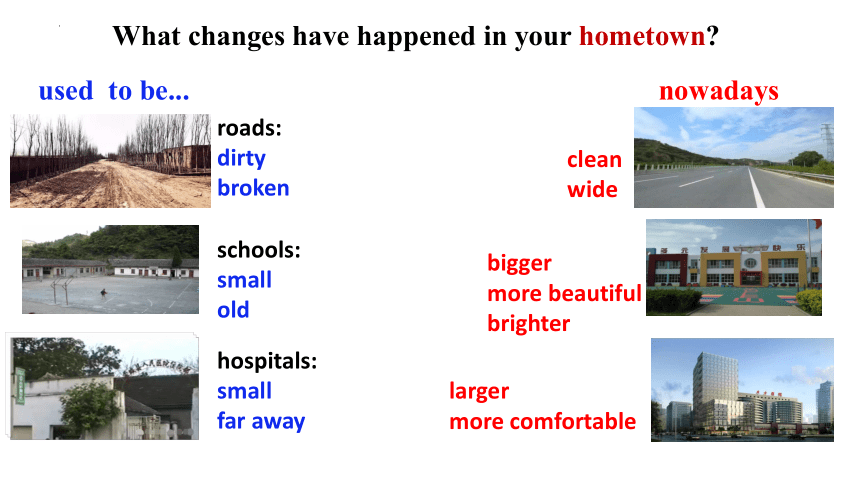 | |
| 格式 | zip | ||
| 文件大小 | 44.2MB | ||
| 资源类型 | 教案 | ||
| 版本资源 | 人教新目标(Go for it)版 | ||
| 科目 | 英语 | ||
| 更新时间 | 2022-07-30 16:31:40 | ||
图片预览

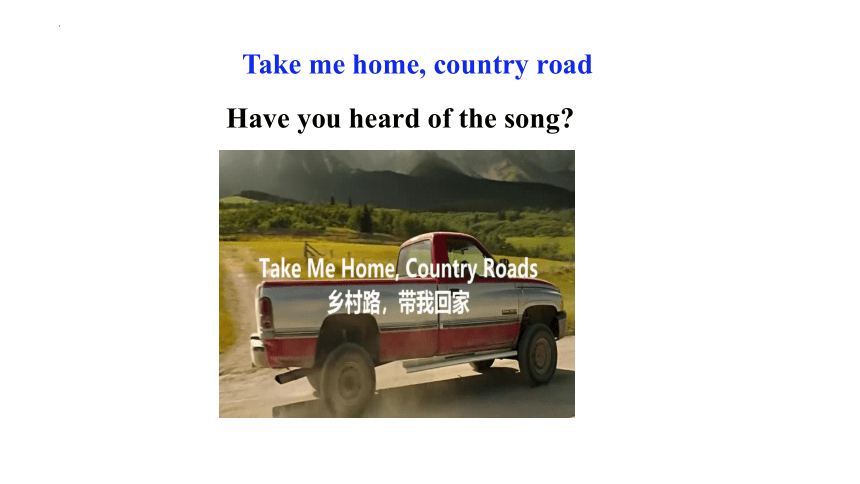
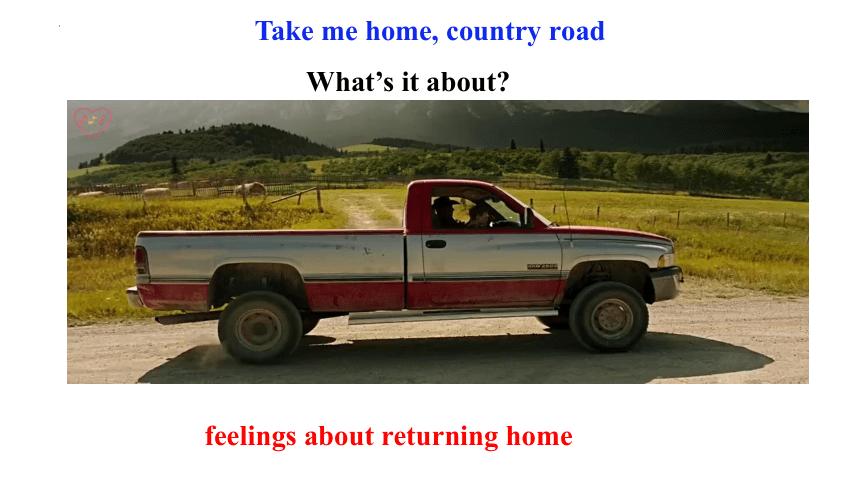
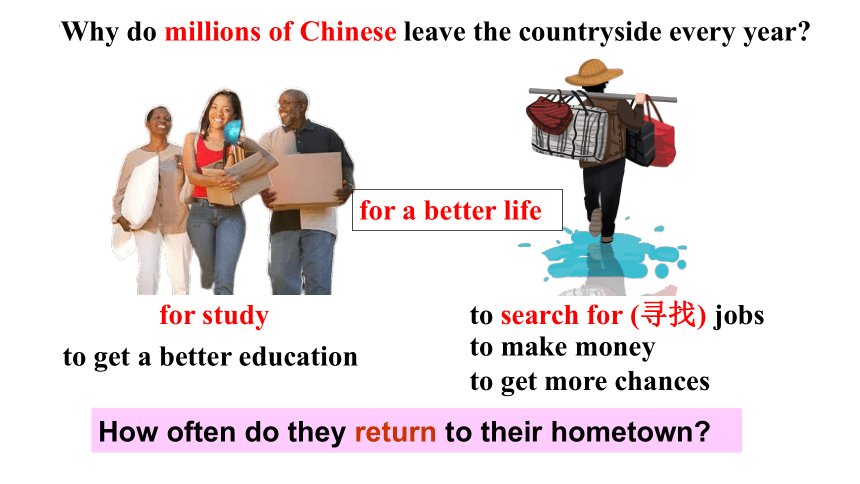
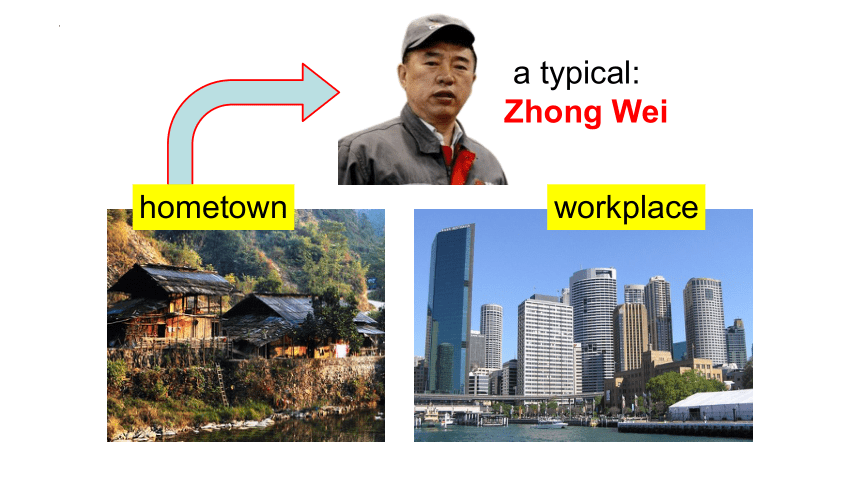
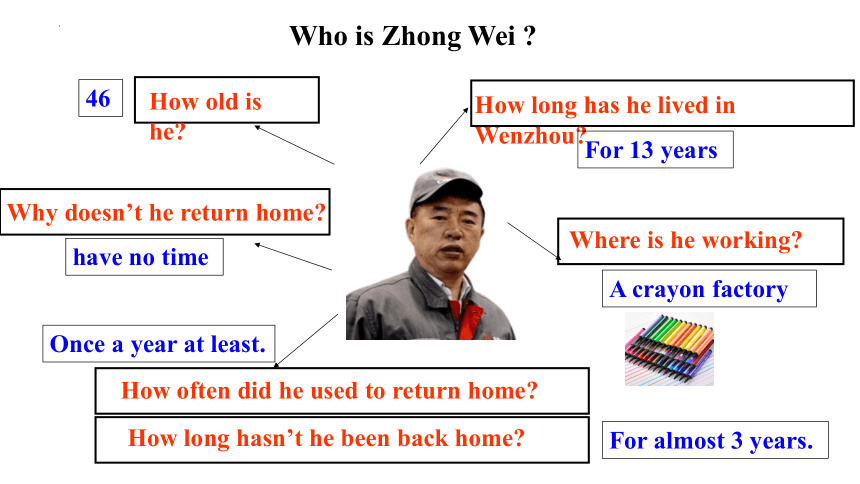
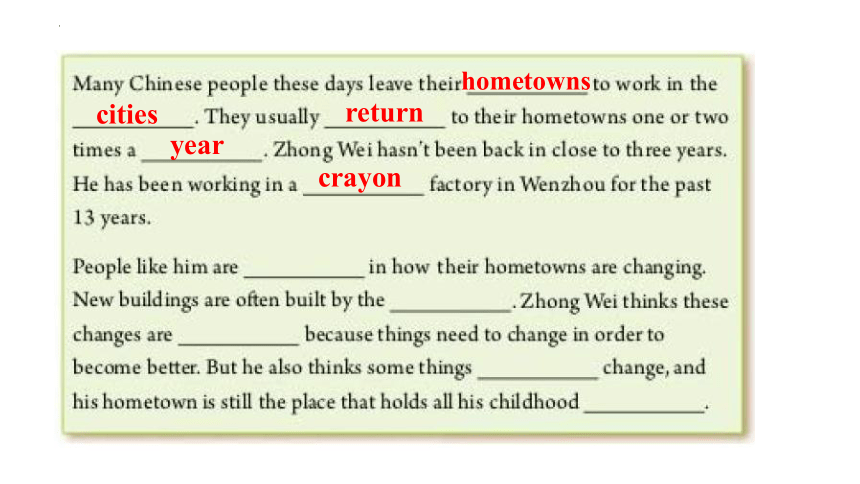
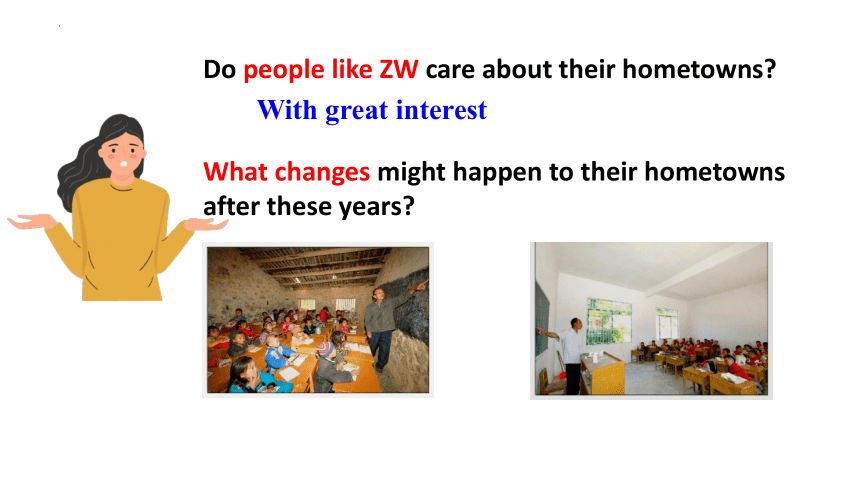

文档简介
(共21张PPT)
What changes have happened in your hometown
used to be...
bigger
more beautiful
brighter
larger
more comfortable
nowadays
roads:
dirty
broken
clean
wide
schools:
small
old
hospitals:
small
far away
Take me home, country road
Have you heard of the song
feelings about returning home
Take me home, country road
What’s it about
Why do millions of Chinese leave the countryside every year
for study
to search for (寻找) jobs
to get a better education
to make money
to get more chances
for a better life
How often do they return to their hometown
a typical:
Zhong Wei
hometown
workplace
Who is Zhong Wei
Why doesn’t he return home
How old is he
Where is he working
How long has he lived in Wenzhou
How often did he used to return home
How long hasn’t he been back home
46
For 13 years
A crayon factory
Once a year at least.
For almost 3 years.
have no time
hometowns
cities
return
year
crayon
Do people like ZW care about their hometowns
What changes might happen to their hometowns after these years
With great interest
new hospitals
new roads
new schools
new teachers
from cities
Who brought these changes
The government.
a new primary shcool
an old primary school
past
now
Children have learned to read and count at my old primary school since the mid- 20 th century(20世纪中期).
1. How long has the old school been used(被使用)
2. What does ZW think of the changes
Such developments are good.
count
________has become a symbol of
Zhong Wei’s hometown.
A. B. C.
2) Most of the children liked to _____
under that big tree.
A. B. C.
According to(根据/依照) ZW, What things will never change
A. The happy childhood(童年)
B. The soft and sweet memories
C. The old school
D. The symbol of the place
Read Para 4 and choose the correct answers.
Many Chinese people these days leave their __________ to work in the _______. They usually _______ to their hometowns one or two times a _______. Zhong Wei hasn't been back in close to three years. He has been working in a ________ factory in Wenzhou for the past 13 years.
People like him are __________ in how their hometowns are changing. New buildings are often built by the _____________. Zhong Wei thinks these changes are _____ because things need to change in order to become better. But he also thinks some things ___________ change, and his hometown is still the place that holds all his childhood _________.
hometown
cities
return
year
crayon
2c
interested
government
good
will never
memories
被...修建
装下,容纳
search sb/sw 搜身/搜查某地
看!警察正在搜Tony的身。
Look! The police are searching Tony.
search for“搜寻;寻找”
look for
昨天Tony到处找Lily,但是没有找到。
Yesterday Tony searched for Lily everywhere,
but he didn’t find it.
find: 找到;发现
find out: 弄清,查明
Nowadays, millions of Chinese leave the countryside to search for work in the cities.
among
1. “在...中” among 三及以上之间
between 在两者之间
Tony坐在一群美女之间。
Tony sits among a group of beauties.
Tony坐在Lily和Linda之间。
Tony sits between Lily and Linda.
2. “...之一” (可与one of互换)
Beijing is among( = one of ) the largest cities in the world.
Among these is Zhang Wei, a 46-year-old husband and father.
among
在...中
between
在...之间
Many people like Zhong Wei regard with great interest how their
hometowns have changed.
regard:
1.看待
2. regard…as 把……视为...
你应该把困难视为挑战。
you should regard difficulties as challenges.
我们总是把红色看作希望和好运的象征。
We always regard red as the symbol of hope and good luck.
I noticed that’s true of my hometown...
1. notice
(1) n. 通知
(2) v. 注意到
我没注意到Tony正在讲话。
I didn’t notice that Tony was talking.
2. be true of... 对...也适用,符合/适用于...
Tony喜欢讲话。Jerry也一样。
Tony likes talking. That’s true of Jerry.
his hometown cannot always stay the same.
stay
1. 停留;待(在某地)
stay at home
站在那儿别动!
Stay there and don’t move!
2. 相当于keep,“保持(状态)”
Tony承诺要和Lily永远做朋友。
Tony promises to stay friends with Lily forever.
According to Zhong Wei, however, some things will never change.
according to... “依照,按照”
according to sb 按照某人的说法
in one’s opinion 在某人看来
按照Tony的说法,学生不应该做作业。
According to Tony/In Tony’s opinion, students shouldn’t do any schoolwork.
In my hometown, there was a big old tree opposite the school.
opposite
(1) prep.
opposite = across from 在...对面
Tony坐在Lily对面
Tony sits opposite Lily. / Tony sits across from Lily.
(2) adj. 对面的;另一边的
Tony属于反方人员。
Tony belongs to the opposite side.
Find expressions in the passage that have the same meanings as these words and phrases.
2b
1. look for _________ 5. go back ____________
2. consider ________ 6. change _____________
3. across from ________ 7. area __________
4. In one’s opinion _____________
search for
regard
opposite
according to…
return
developments
place
What changes have happened in your hometown
used to be...
bigger
more beautiful
brighter
larger
more comfortable
nowadays
roads:
dirty
broken
clean
wide
schools:
small
old
hospitals:
small
far away
Take me home, country road
Have you heard of the song
feelings about returning home
Take me home, country road
What’s it about
Why do millions of Chinese leave the countryside every year
for study
to search for (寻找) jobs
to get a better education
to make money
to get more chances
for a better life
How often do they return to their hometown
a typical:
Zhong Wei
hometown
workplace
Who is Zhong Wei
Why doesn’t he return home
How old is he
Where is he working
How long has he lived in Wenzhou
How often did he used to return home
How long hasn’t he been back home
46
For 13 years
A crayon factory
Once a year at least.
For almost 3 years.
have no time
hometowns
cities
return
year
crayon
Do people like ZW care about their hometowns
What changes might happen to their hometowns after these years
With great interest
new hospitals
new roads
new schools
new teachers
from cities
Who brought these changes
The government.
a new primary shcool
an old primary school
past
now
Children have learned to read and count at my old primary school since the mid- 20 th century(20世纪中期).
1. How long has the old school been used(被使用)
2. What does ZW think of the changes
Such developments are good.
count
________has become a symbol of
Zhong Wei’s hometown.
A. B. C.
2) Most of the children liked to _____
under that big tree.
A. B. C.
According to(根据/依照) ZW, What things will never change
A. The happy childhood(童年)
B. The soft and sweet memories
C. The old school
D. The symbol of the place
Read Para 4 and choose the correct answers.
Many Chinese people these days leave their __________ to work in the _______. They usually _______ to their hometowns one or two times a _______. Zhong Wei hasn't been back in close to three years. He has been working in a ________ factory in Wenzhou for the past 13 years.
People like him are __________ in how their hometowns are changing. New buildings are often built by the _____________. Zhong Wei thinks these changes are _____ because things need to change in order to become better. But he also thinks some things ___________ change, and his hometown is still the place that holds all his childhood _________.
hometown
cities
return
year
crayon
2c
interested
government
good
will never
memories
被...修建
装下,容纳
search sb/sw 搜身/搜查某地
看!警察正在搜Tony的身。
Look! The police are searching Tony.
search for“搜寻;寻找”
look for
昨天Tony到处找Lily,但是没有找到。
Yesterday Tony searched for Lily everywhere,
but he didn’t find it.
find: 找到;发现
find out: 弄清,查明
Nowadays, millions of Chinese leave the countryside to search for work in the cities.
among
1. “在...中” among 三及以上之间
between 在两者之间
Tony坐在一群美女之间。
Tony sits among a group of beauties.
Tony坐在Lily和Linda之间。
Tony sits between Lily and Linda.
2. “...之一” (可与one of互换)
Beijing is among( = one of ) the largest cities in the world.
Among these is Zhang Wei, a 46-year-old husband and father.
among
在...中
between
在...之间
Many people like Zhong Wei regard with great interest how their
hometowns have changed.
regard:
1.看待
2. regard…as 把……视为...
你应该把困难视为挑战。
you should regard difficulties as challenges.
我们总是把红色看作希望和好运的象征。
We always regard red as the symbol of hope and good luck.
I noticed that’s true of my hometown...
1. notice
(1) n. 通知
(2) v. 注意到
我没注意到Tony正在讲话。
I didn’t notice that Tony was talking.
2. be true of... 对...也适用,符合/适用于...
Tony喜欢讲话。Jerry也一样。
Tony likes talking. That’s true of Jerry.
his hometown cannot always stay the same.
stay
1. 停留;待(在某地)
stay at home
站在那儿别动!
Stay there and don’t move!
2. 相当于keep,“保持(状态)”
Tony承诺要和Lily永远做朋友。
Tony promises to stay friends with Lily forever.
According to Zhong Wei, however, some things will never change.
according to... “依照,按照”
according to sb 按照某人的说法
in one’s opinion 在某人看来
按照Tony的说法,学生不应该做作业。
According to Tony/In Tony’s opinion, students shouldn’t do any schoolwork.
In my hometown, there was a big old tree opposite the school.
opposite
(1) prep.
opposite = across from 在...对面
Tony坐在Lily对面
Tony sits opposite Lily. / Tony sits across from Lily.
(2) adj. 对面的;另一边的
Tony属于反方人员。
Tony belongs to the opposite side.
Find expressions in the passage that have the same meanings as these words and phrases.
2b
1. look for _________ 5. go back ____________
2. consider ________ 6. change _____________
3. across from ________ 7. area __________
4. In one’s opinion _____________
search for
regard
opposite
according to…
return
developments
place
同课章节目录
- Unit 1 What's the matter?
- Section A
- Section B
- Unit 2 I'll help to clean up the city parks.
- Section A
- Section B
- Unit 3 Could you please clean your room?
- Section A
- Section B
- Unit 4 Why don't you talk to your parents?
- Section A
- Section B
- Unit 5 What were you doing when the rainstorm came
- Section A
- Section B
- Review of Units 1-5
- Unit 6 An old man tried to move the mountains.
- Section A
- Section B
- Unit 7 What's the highest mountain in the world?
- Section A
- Section B
- Unit 8 Have you read Treasure Island yet?
- Section A
- Section B
- Unit 9 Have you ever been to a museum?
- Section A
- Section B
- Unit 10 I've had this bike for three years.
- Section A
- Section B
